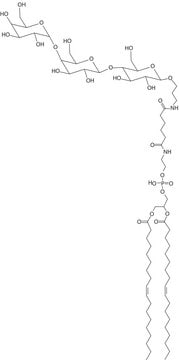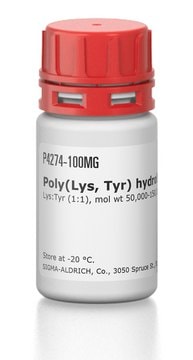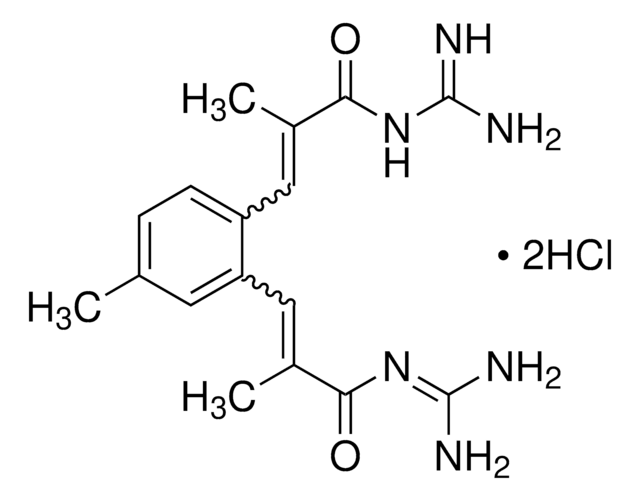P1152
Poly(Ala, Glu, Lys, Tyr) 6:2:5:1 hydrobromide
Ala:Glu:Lys:Tyr (6:2:5:1), mol wt 20,000-30,000
Synonym(s):
(L-Ala, L-Glu, L-Lys, L-Tyr)n ·HBr, COP-1
About This Item
Recommended Products
form
powder
feed ratio
Ala:Glu:Lys:Tyr (6:2:5:1)
mol wt
20,000-30,000
greener alternative product score
old score: 56
new score: 39
Find out more about DOZN™ Scoring
greener alternative product characteristics
Designing Safer Chemicals
Safer Solvents and Auxiliaries
Reduce Derivatives
Learn more about the Principles of Green Chemistry.
sustainability
Greener Alternative Product
color
white to off-white
greener alternative category
storage temp.
−20°C
InChI
1S/C9H11NO3.C6H14N2O2.C5H9NO4.C3H7NO2/c10-8(9(12)13)5-6-1-3-7(11)4-2-6;7-4-2-1-3-5(8)6(9)10;6-3(5(9)10)1-2-4(7)8;1-2(4)3(5)6/h1-4,8,11H,5,10H2,(H,12,13);5H,1-4,7-8H2,(H,9,10);3H,1-2,6H2,(H,7,8)(H,9,10);2H,4H2,1H3,(H,5,6)/t8-;5-;3-;2-/m0000/s1
InChI key
YLOCGHYTXIINAI-XKUOMLDTSA-N
General description
Biochem/physiol Actions
Reported to have suppressive effect on experimental allergic encephalomyelitis induced in laboratory animals.
Analysis Note
Other Notes
Storage Class Code
11 - Combustible Solids
WGK
WGK 3
Flash Point(F)
Not applicable
Flash Point(C)
Not applicable
Personal Protective Equipment
Certificates of Analysis (COA)
Search for Certificates of Analysis (COA) by entering the products Lot/Batch Number. Lot and Batch Numbers can be found on a product’s label following the words ‘Lot’ or ‘Batch’.
Already Own This Product?
Find documentation for the products that you have recently purchased in the Document Library.
Articles
Humankind has utilized protein materials throughout its existence, starting with the use of materials such as wool and silk for warmth and protection from the elements and continuing with the use of recombinant DNA techniques to synthesize proteins with unique and useful properties.
Our team of scientists has experience in all areas of research including Life Science, Material Science, Chemical Synthesis, Chromatography, Analytical and many others.
Contact Technical Service








